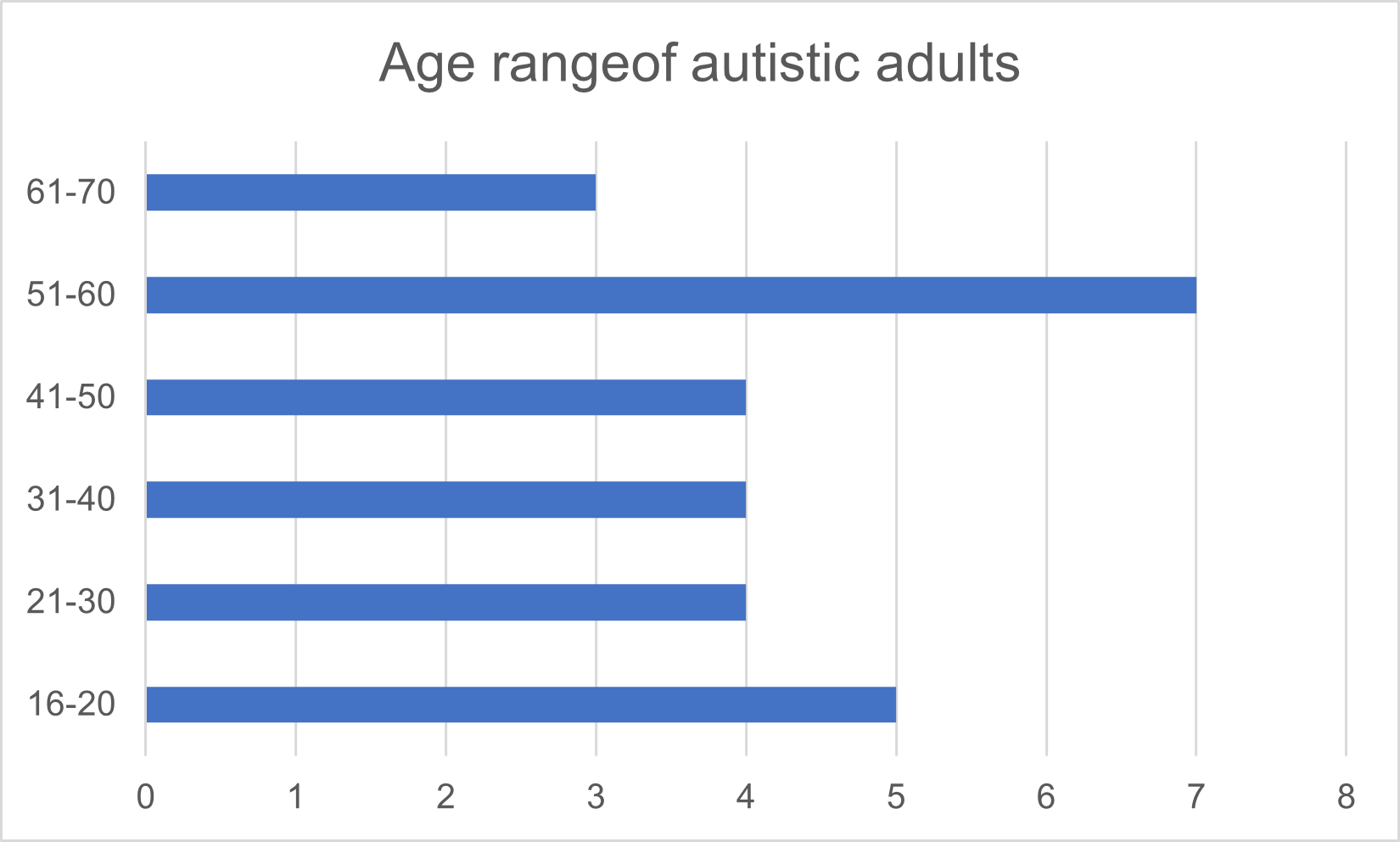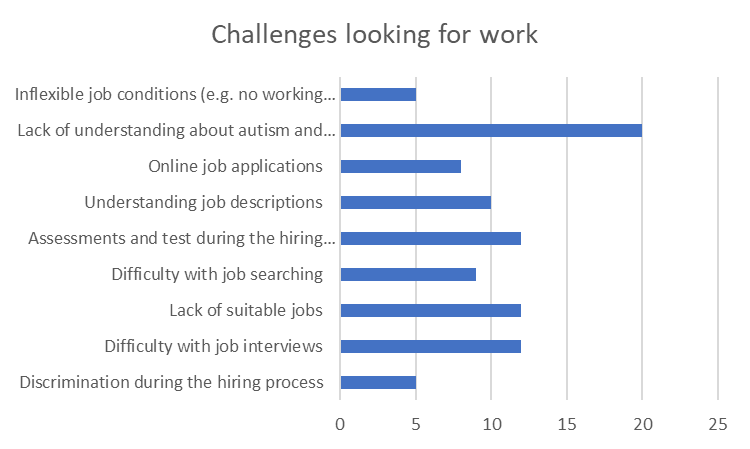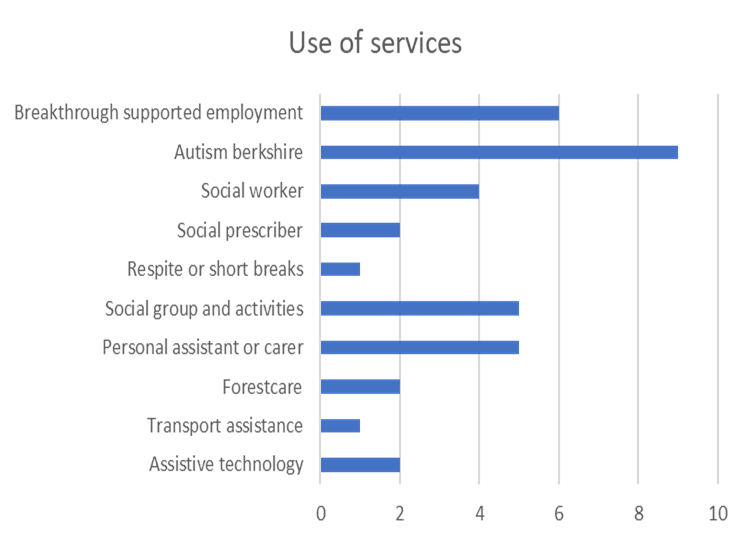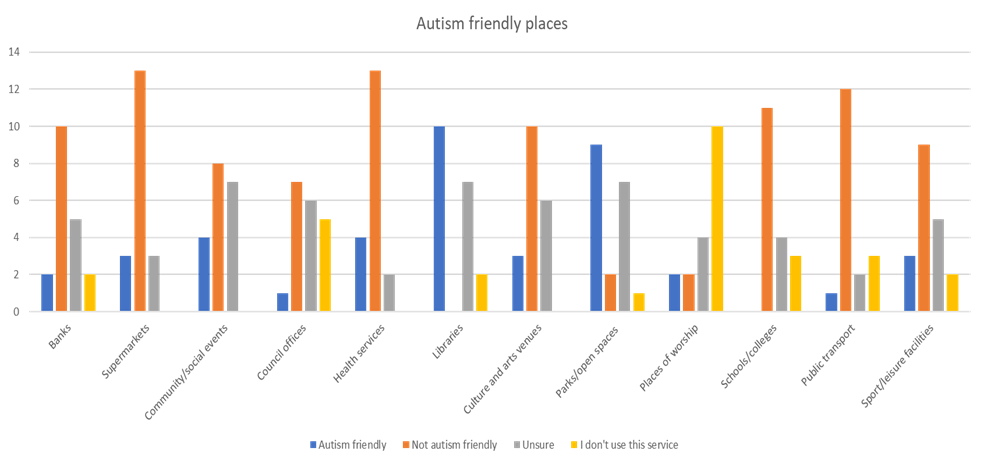27 people completed the survey. They were aged between 16 and 70 years old. More females than males responded to the survey. Most people received support from family and friends.

What we asked
How does your living situation meet your needs?
Most autistic adults said they lived with family, partners or independently.
99% of respondents said their current living situation met some or all of their needs.
Those that lived with family or partners received support with travelling, bills, appointments and shopping.
The biggest challenges were around noise (from neighbours in social housing accommodation where they had no choice) or in busy households. People living at home (with parents) felt they had no independence. Whilst those living independently felt they had too little social contact.
Have you been involved with the Criminal Justice Service?
8 of our respondents had been involved with the Criminal Justice Service (CJS) at some point.
3 of them were aware of support within the CJS.
There were concerns that some carers or homes involve the police when the autistic person is having a ‘bad day’ and there needs to be better understanding of what causes an autistic person to get upset and how to make an autistic person feel safe. Those that found themselves in police custody said that the situation was often exacerbated by not having access to intermediaries from the first point of contact, or people they know to make them feel safe.
Support for young autistic adults in police stations is limited. Adult social care (ASC) does attend, but it depends on circumstances whether ASC give support.
In 2024 the National Appropriate Adult Network (NAAN) training was introduced. It is a requirement that you have this training to be able to support a young adult in police custody and the training has not yet been fully rolled out.
Health partners will also provide an appropriate adult but only if the person has a diagnosed learning disability as well as autism.
A government report on neurodivergent people in the CJS and a cross-party action plan was agreed in 2021 and updated in 2023. One of the actions is to make sure of better understanding and accommodations of autistic people from the first point of contact, which includes access to intermediaries.1
Apart from access to intermediaries, the biggest issues were around noisy cells, communication and lack of understanding. Autism Berkshire are currently involved in a project with Bracknell Forest and Thames Valley Police to try and address these known issues.
How are your health needs met?
Autistic adults said almost 50% were diagnosed in adulthood.
Post diagnosis, 2 people were referred to social services for a needs assessment. These were the only 2 who received any information on autism post diagnosis.
6 people said their GP practice never met their needs. These same practices were also found to be most supportive by other people. This suggests a more tailored approached is needed.
Following the survey results, we ran a focus group with autistic adults to assure our priorities. They highlighted unmet mental health needs, as well as physical health needs.
Some of those diagnosed with autism in childhood, who had received support from the Child and Adolescent Mental Health Service (CAMHs) teams, felt that once they had turned 18, there was little if any support from adult mental health teams and that this was something not addressed by their GP.
They felt GP practices could improve by advertising if they are autism friendly and undertake training to improve their understanding about what autistic people might need to reduce their anxiety.
Face to face appointments, for longer and being able to see the same doctor were all suggestions to improve autistic people’s experience.
What is your employment status?
Autistic adults said:
- 54% of respondents are employed
- 4% are students
Of those in work, 19 people regularly needed reasonable adjustments including:
- noise cancelling headphones
- adjustable lighting
- reduced noise or smell
- more space
- clear communication
- notice of change, not rushed
- chunked information
Suggestions for improving experience of work included making reasonable adjustments normal and improving links with employers to help autistic people access work.
"A lot of people (such as employers) aren't always knowledgeable in this field, so it makes it harder to advocate for myself, as they don't always know or understand how I feel or why I do what I do or why I need what I need. If people were more knowledgeable, it would make it easier to advocate for myself to help myself."
The main challenges looking for work were lack of understanding about autism.

What services are you aware of and which ones do you use?
Autistic adults said the service they were most aware of was Breakthrough Employment, however more people used Autism Berkshire.

- 100% of those who used assistive technology, Transport assistance, Breakthrough supported employment, a personal assistant or carer found this effective or OK
- 100% who used Respite, social prescribers or Forest Care found it OK
- 67% who used social groups found them effective or OK (33% found social groups not effective)
- 80% of those with a social worker found this effective or OK (20% cent found this not effective)
- 78% who used Autism Berkshire found them effective or OK (22%) found Autism Berkshire not effective
How autism friendly is Bracknell Forest?
Autistic adults said the most autism friendly places in Bracknell Forest were libraries and parks. People in our focus group also found Southwest Trains to be very autism friendly and reported that some of the buses are also becoming more autism aware.
The least autism friendly places were supermarkets and health services.

What do places need to be more autism friendly?
Autistic adults said:
- time period for autistic people only
- having times when sensory input is reduced
- more autism awareness in businesses such as banks
- safe spaces, reduced noise, lower lighting, blue badges
- no music
- more awareness on public transport
- better understanding of autism at leisure centres and arts centres
Generally, it was felt there was a lack of information about autism in Bracknell Forest. The top 3 sources of information were from the internet, social media and parents and carers
What is the one thing that you would change?
Autistic people said:
- adaptive housing
- own place where noise levels are low
- understanding from health services
- work experience on railway and find a job that meet my needs
- low level support for high functioning autistic adults
- reduce working hours so I can rest
- understand myself better
- small group of friends
- diagnosis